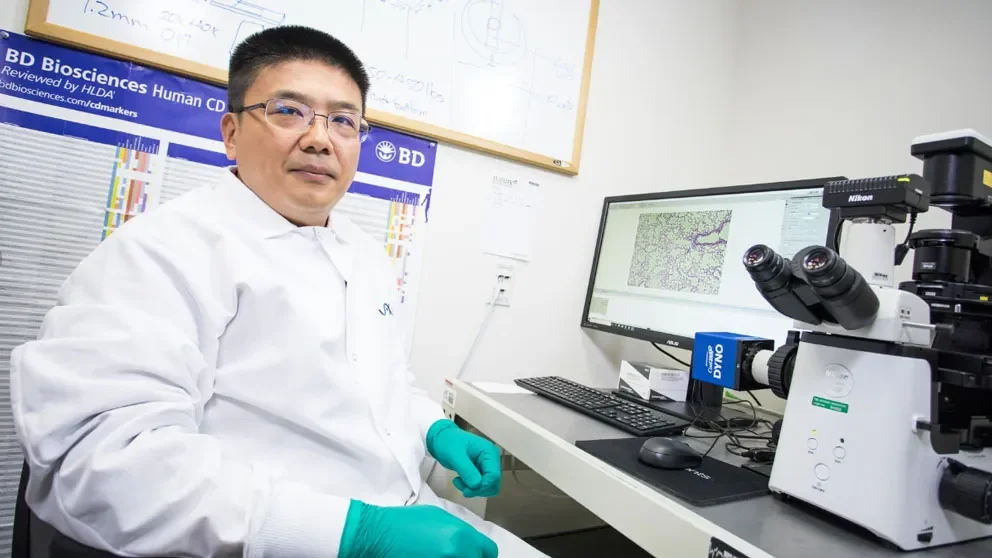Overcoming breast cancer chemotherapy resistance
The Search Magazine Article | March 4, 2020
Chemo may trigger changes in the tissue environment that enable cancer metastasis.
“Chemotherapy has significantly improved the survival of breast cancer patients,” says Jackson Laboratory (JAX) Assistant Professor Gary Ren. “But treatment failure still remains a major clinical issue worldwide.”
Most breast cancers are carcinomas, tumors that start in the epithelial cells that line organs and tissues throughout the body. (Carcinomas that start in the milk ducts or lobules of the breast are usually designated adenocarcinomas.) Patients with breast cancer typically receive chemotherapy to block the growth of tumor cells and prevent metastasis, the migration of tumor cells to the lungs or other vital organs.
Normal epithelial tissue has a support network called the tissue stroma or microenvironment, a variety of cells that communicate and collaborate to maintain cell health. For example, the stroma recruits repair mechanisms when epithelial tissue is injured or damaged. But when a genetic alteration occurs in an epithelial cell, the newly cancerous cell highjacks the stroma to maintain and protect it, even from chemotherapy.
Current knowledge about treatment failure is mostly derived from research on intrinsic and acquired chemo-resistance in epithelial tumor cells. However, Ren says, recent studies have implicated a critical role for host cells (i.e., the tissue microenvironment) in building a protective “niche” for tumor cells, enabling their escape from chemotherapeutic treatments. “Notably, the host regenerative response upon chemotherapy ‘injury’, which is regarded as a mechanism to repair damaged tissues, may be exploited by tumor cells for their local recurrence or distant metastases.”
The National Cancer Institute (NCI) has awarded Ren a five-year grant totaling $1,946,663 to study how chemotherapy-induced changes in the lung stroma foster the growth of metastatic breast tumor cells in the lung. The grant is a special-category R37 MERIT (Method to Extend Research in Time) award, which enables early-stage investigators to obtain a two-year funding extension upon the successful completion of the initial five-year basic research project (R01) grant.
Ren’s co-investigators on the grant are JAX Professor Lenny Shultz,an expert in mouse models of human disease, and Bora Lim, M.D., assistant professor in the department of breast medical oncology at the University of Texas MD Anderson Cancer Center.
“Our study will energize an underdeveloped field of research that investigates the impact of cancer therapeutics on the pre-metastatic microenvironment.” Ren says. “Our findings will facilitate the development of clinically applicable strategies to improve treatment efficacy and prevent metastatic relapse of breast cancer by interfering with the tissue metastatic microenvironment.”
Ren’s lab has previously established that mesenchymal stem cells (MSCs) in the stroma acquire a significantly higher potential to promote local tumor growth after receiving cancer therapy. They recently published a comprehensive review of the roles of MSCs in regeneration and cancer.
“We are now going to explore how chemotherapy treatment stimulates regenerative responses in MSCs in the lungs, making the lungs a safe haven for migrating drug-resistant tumor cells,” he says.
Ren and his lab will investigate how two widely used chemotherapeutic drugs (cisplatin and doxorubicin) alter MSCs in the lungs of mouse models to allow metastatic tumor growth in the lung. They will also analyze specimens from breast cancer patients to find ways to both predict and block metastatic relapse of breast cancer patients after chemotherapy.
National Cancer Institute: The Role of Lung Resident Mesenchymal Stem Cells in Post-Chemotherapy Lung Metastases of Breast Cancer. Grant 1R37CA237307-01A1, Method to Extend Research in Time (MERIT) Award

